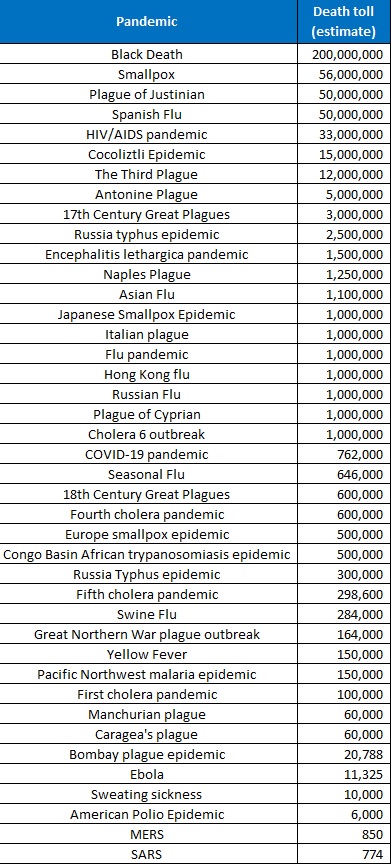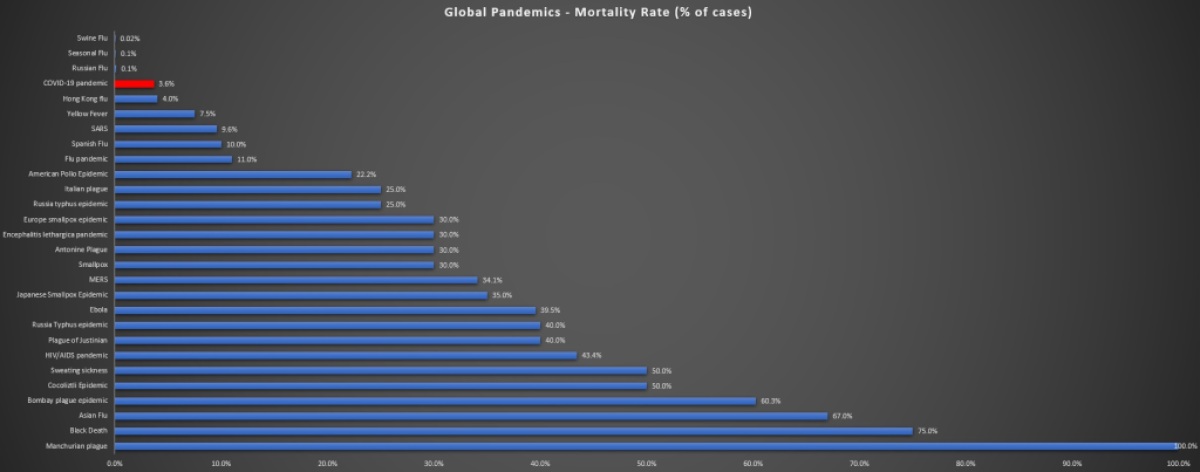Note: the below piece is based on a 60-minute research of publically available information and is not my personal opinion regarding the importance or impact of any one particular pandemic.
The Spanish flu pandemic of 1918 is thought to have infected 500 million people globally, or about 27% of the world’s population. The death toll from the Spanish flu is estimated to have been in the vicinity of 40 to 50 million, although some estimates are as high as 100 million. In effect, the death toll from Spanish flu was somewhere in the vicinity of 2.2% to 5.4% of the 1918 world population.
The COVID-19 pandemic has had far-reaching consequences beyond the spread of the disease itself and efforts to quarantine it. So far, COVID-19 has tragically killed over 762,000 people worldwide.
Some other notable diseases’ annual impacts (that are still in circulation):
- Global tuberculosis toll is well over a million.
- Malaria still kills half a million worldwide despite decades of efforts at treatment as well as prevention.
- Pneumonia kills about 1.5 million.
- Dengue affects millions and kills tens of thousands.
In a strongly connected and integrated world, the impacts of COVID-19 beyond mortality (those who die) and morbidity (those who are incapacitated or caring for the incapacitated and unable to work for a period) has become apparent since the outbreak.
Here are a few statistics in terms of impacts* (as at 15 August 2020):
- 188: Number of countries with COVID-19 cases
- 4.9%: Contraction in global GDP in 2020; worst since the Great Depression of the 1920s
- $34.2 billion: Contraction in Australia’s GDP in 2020
- $12 trillion: Cumulative output loss to the global economy across 2020 and 2021
- $3.8 trillion: Estimated global consumption loss
- 147 million: Job losses (equivalent full-time positions); 4.2 percent of the global workforce
- $2.1 trillion: Loss in wages and salaries
* Google, World Economic Forum and Other Research Reports
The social costs are yet to have an official number but would be in the BILLIONS, if not TRILLIONS! We need to focus on the following social issues:
- Homelessness – The COVID-19 crisis will disproportionately affect those that are currently homeless or at risk of homelessness with respect to an increased risk of exposure and a greater likelihood of severe cases and mortality.
- Loneliness & Social Connection – It’s important we focus on keeping up social connections even while physically distancing – it’s perhaps our greatest resource and underpins social capital, social cohesion, good health, great neighbourhoods and being a happy human.
- Protecting People with Disability – There is an urgent need for the disability and health sectors to develop a coordinated response that protects the health of millions of people with disability.
- Digital Inclusion – The world’s response to containing COVID-19 needs us to be more digitally connected than ever. Yet, more than 2.5 million Australians are not online and many of those who are lack the skills to benefit fully from this connectivity
- Home Learning and COVID-19 – All over Australia, students are studying and learning at home instead of in schools. For families with school-aged children, home is not just home anymore but also a school. Parents, students and teachers are coming to grips with this new paradigm as they adjust to their home-learning environment.
- Indigenous Financial Impacts – In 2019, research estimated that across Australia, one in ten Indigenous people who took our survey were classified as financially secure, based on our framework of financial resilience.
- Social Isolation, Ageing, and COVID-19 – Older people are at greater risk of the complications associated with COVID-19 and as a result, they are being asked to socially isolate. However, this brings with it a number of challenges that impact older people’s wellbeing.
- Youth Unemployment – Social distancing, stay-at-home restricutions, business closures etc have resulted in disproportionate disruption to youth employment, and outlines how younger people will be more likely to face deeper impacts in their employment with consequent social impacts in years to come.
- Teacher Wellbeing – The health and safety of teachers and their families must be a priority as they try and balance the different demands at work and home.
We can survive an economic depression. We have done it before. How we overcome a social-capital depression remains to be seen.
Where does COVID-19 rank at present on the ‘global pandemics of all time’ list?
Note: below is as at 15 August 2020; noting the COVID-19 pandemic has just begun compared to pandemics that have fully played out, sometimes over multiple years.





